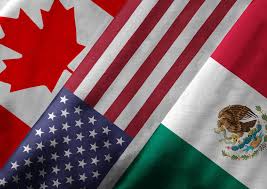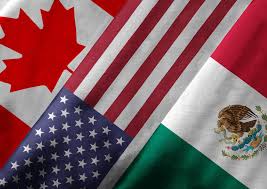
Canada’s limited success in diversifying exports leaves the nation too reliant on U.S. markets to play hardball despite Canada’s threats to walk away from NAFTA talks if necessary.
There are many tough items that are expected to be debated in the soon to be commencing third round of talks on modernizing the North American Free Trade Agreement when negotiators from Canada, Mexico and the United States will gather in Ottawa.
Unless major changes in are made, U.S. President Donald Trump says he will ditch the pact. If the United States pushed to remove a key dispute-settlement mechanism, Canada last month suggested it could also walk away.
But for the government of Liberal Prime Minister Justin Trudeau, leaving the table remains very much a last-ditch measure, insiders say.
“The desire is 100 percent to modernize ... it is still true to say no deal is better than a bad deal but obviously that would be a pretty extraordinary set of circumstances,” said one person familiar with government thinking.
Firms in Canada flourish operating next to the world’s largest economy and the United States accounts for 75 percent of goods exports from Canada. Both nations employ the same business practices, operates in English and transport costs are low.
In theory, a 3.5 percent tariff would be applicable to Canadian and Mexican exports as is applicable to members of the World Trade Organization if NAFTA ceased to exist.
Canadian gross domestic product would shrink by 1.9 percent a year and many jobs would be lost, a survey by Export Development Canada last year predicted.
Borders barely exist, especially for key sectors such as the auto industry, as supply chains have become so integrated ever since NAFTA came into force in 1994.
“Is this the most important trade agreement for Canada? Damn right it is,” said Dennis Darby, president and CEO of the Canadian Manufacturers and Exporters, adding that dismantling the deal would be like trying to “unwind a clock”.
Mexico has been more exertive because it has much more tense relationship with Trump than Canada does. Mexico’s officials point out that half of its exports is not subject to NAFTA rules even though an even greater share of its exports - around 80 percent - go to the United States.
Rather than following complex procedures to get their goods into the United States duty-free, some Mexican firms choose to pay WTO tariffs, experts say.
If NAFTA vanished and said Mexico would deepen trade with other nations, “there would be no leap into the abyss”, Mexican Foreign Minister Luis Videgaray last week said.
Since the early 1970s, when the Liberal administration of Pierre Trudeau - Justin’s father - tried to boost access to Japan and the European Union, the dependence on a single market has worried Canadian governments on and off.
But a staggering 84 percent from 67 percent in 1973 was the rise in the share of Canadian goods exports going to the United States by 2000.
“The major economies outside of North America have trouble taking Canada seriously ... it’s not easy being Canadian,” said Derek Burney, a former Canadian ambassador to Washington who worked on NAFTA.
(Source:www.reuters.com)
There are many tough items that are expected to be debated in the soon to be commencing third round of talks on modernizing the North American Free Trade Agreement when negotiators from Canada, Mexico and the United States will gather in Ottawa.
Unless major changes in are made, U.S. President Donald Trump says he will ditch the pact. If the United States pushed to remove a key dispute-settlement mechanism, Canada last month suggested it could also walk away.
But for the government of Liberal Prime Minister Justin Trudeau, leaving the table remains very much a last-ditch measure, insiders say.
“The desire is 100 percent to modernize ... it is still true to say no deal is better than a bad deal but obviously that would be a pretty extraordinary set of circumstances,” said one person familiar with government thinking.
Firms in Canada flourish operating next to the world’s largest economy and the United States accounts for 75 percent of goods exports from Canada. Both nations employ the same business practices, operates in English and transport costs are low.
In theory, a 3.5 percent tariff would be applicable to Canadian and Mexican exports as is applicable to members of the World Trade Organization if NAFTA ceased to exist.
Canadian gross domestic product would shrink by 1.9 percent a year and many jobs would be lost, a survey by Export Development Canada last year predicted.
Borders barely exist, especially for key sectors such as the auto industry, as supply chains have become so integrated ever since NAFTA came into force in 1994.
“Is this the most important trade agreement for Canada? Damn right it is,” said Dennis Darby, president and CEO of the Canadian Manufacturers and Exporters, adding that dismantling the deal would be like trying to “unwind a clock”.
Mexico has been more exertive because it has much more tense relationship with Trump than Canada does. Mexico’s officials point out that half of its exports is not subject to NAFTA rules even though an even greater share of its exports - around 80 percent - go to the United States.
Rather than following complex procedures to get their goods into the United States duty-free, some Mexican firms choose to pay WTO tariffs, experts say.
If NAFTA vanished and said Mexico would deepen trade with other nations, “there would be no leap into the abyss”, Mexican Foreign Minister Luis Videgaray last week said.
Since the early 1970s, when the Liberal administration of Pierre Trudeau - Justin’s father - tried to boost access to Japan and the European Union, the dependence on a single market has worried Canadian governments on and off.
But a staggering 84 percent from 67 percent in 1973 was the rise in the share of Canadian goods exports going to the United States by 2000.
“The major economies outside of North America have trouble taking Canada seriously ... it’s not easy being Canadian,” said Derek Burney, a former Canadian ambassador to Washington who worked on NAFTA.
(Source:www.reuters.com)





